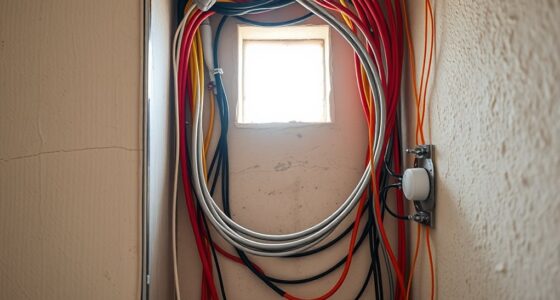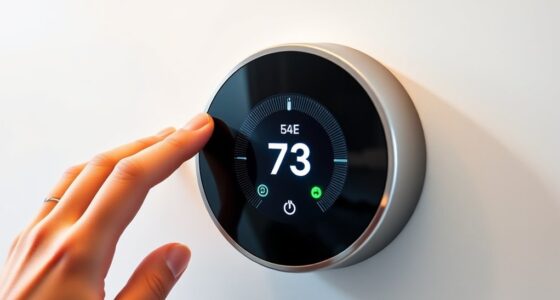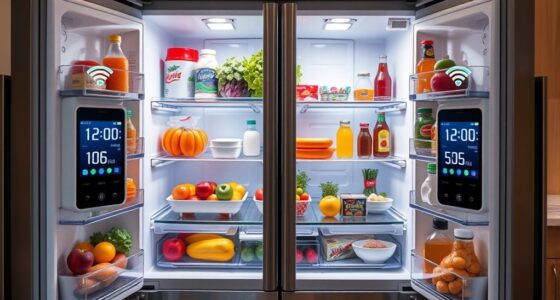The Matter protocol is set to make your smart home devices work smoothly together by using a universal language. It addresses compatibility issues, so your gadgets from different brands can communicate reliably without fuss. With support from major brands and integration with platforms like Apple, Google, and Amazon, it offers a future-proof solution that simplifies setup and enhances your experience. Stay tuned to discover how this new standard will transform your connected living.
Key Takeaways
- Matter is a universal protocol enabling smart home devices from different brands to communicate seamlessly.
- It simplifies device setup, reduces compatibility issues, and ensures reliable command execution across ecosystems.
- Major tech brands support Matter, making it the upcoming industry standard for smart home integration.
- Devices automatically recognize each other when Matter-enabled, eliminating the need for multiple apps.
- It fosters a more accessible, secure, and flexible smart home environment by establishing a common language.

Have you ever wondered how smart home devices from different brands work seamlessly together? It’s a common question for anyone trying to build or enhance a connected home. The answer lies in a technology called the Matter protocol, which aims to unify device interoperability across the smart home ecosystem. Currently, many gadgets operate on their own proprietary protocols, which can cause compatibility issues. You might find yourself frustrated when a smart light doesn’t sync with your voice assistant or a security camera won’t connect to your hub. That’s where Matter steps in, acting as a universal language that all these devices can speak.
Imagine walking into your home and telling your smart assistant to turn on the lights, adjust the thermostat, and open the door. With Matter, these commands become more reliable because the devices understand and respond to a common set of standards. This new protocol simplifies the process for manufacturers, enabling them to create products that work effortlessly together, regardless of brand or ecosystem. For you, it means less time troubleshooting connectivity and more time enjoying the convenience of your smart home.
Matter is designed to be secure, reliable, and easy to use. It builds on existing standards and integrates with popular ecosystems like Apple HomeKit, Google Home, and Amazon Alexa. This broad compatibility ensures that your devices will be future-proof, reducing the need to buy new gadgets just to upgrade your system. Plus, Matter’s focus on device interoperability means you won’t be confined to a single brand; instead, you can mix and match devices from different manufacturers knowing they’ll work harmoniously. Additionally, ongoing developments in AI Security are expected to further enhance the protocol’s ability to detect and respond to potential threats, making your smart home even safer.
Getting your smart home devices to communicate through Matter requires compatible hardware and software updates. Many major brands have already announced support for the protocol, and it’s expected to become the standard in the industry soon. Once your devices are Matter-enabled, they’ll automatically recognize each other and coordinate more smoothly. This interoperability minimizes setup time, reduces frustration, and enhances the overall smart home experience.
In essence, Matter is set to revolutionize how your smart home functions by establishing a common language for devices. It makes the entire ecosystem more accessible and dependable, so you can enjoy the true convenience of a unified, interoperable smart home. As this protocol becomes more widespread, you’ll notice fewer compatibility hiccups and greater freedom to choose the best gadgets for your needs. It’s the future of smart living—simple, secure, and seamlessly connected.
Frequently Asked Questions
Will Matter Support All Smart Home Brands Universally?
You’re wondering if Matter will support all smart home brands universally. While it aims to improve interoperability and reduce brand compatibility issues, it may not cover every brand immediately. Some devices might still face interoperability challenges initially, but overall, Matter is designed to create a more unified ecosystem. You’ll likely see broader support over time, making it easier to connect your favorite brands without hassle.
How Secure Is Data Transmission With Matter Protocol?
Think of data transmission like sending a secret letter—you’re safe if it’s sealed tight. With the Matter protocol, your data gets protected using strong encryption standards, like a digital lock. It also guarantees data integrity, so your info isn’t tampered with during transit. This means your smart home devices communicate securely, reducing risks of hacking or data breaches, giving you peace of mind with every command you send.
Can Existing Devices Be Upgraded to Support Matter?
You might wonder if your existing devices can support Matter. The good news is, some devices are designed with device compatibility in mind, allowing for firmware updates to enable Matter support. The upgrade process is usually straightforward, involving a software update from the manufacturer. However, not all devices are compatible, so it’s best to check with your device maker to see if an upgrade is possible.
What’S the Expected Rollout Timeline for Matter-Compatible Products?
Did you know that over 30% of smart home devices face compatibility challenges? You can expect Matter-compatible products to roll out gradually starting late 2023, with mainstream availability in 2024. While early adopters may see devices sooner, widespread user adoption might take time as manufacturers finalize integration. Staying updated guarantees you’re ready when your gadgets speak the same language, making your smart home more seamless and reliable.
Will Matter Replace Current Proprietary Smart Home Protocols Entirely?
You might wonder if Matter will fully replace proprietary smart home protocols. While it aims to improve interoperability, challenges like compatibility issues and interoperability challenges could slow adoption. Additionally, user privacy concerns may influence how quickly manufacturers embrace it. Ultimately, Matter is expected to coexist with existing protocols for a while, easing shifts and addressing these challenges, rather than replacing all proprietary systems immediately.
Conclusion
As Matter Protocol 101 shows, your gadgets are about to communicate more seamlessly than ever. With this new standard, you’ll enjoy smarter, more reliable connections that simplify your life. Are you ready to embrace a future where your devices work together effortlessly? The era of fragmented tech is ending—get prepared to experience a connected world like never before. The question is, are you ready to make the switch and stay ahead?









